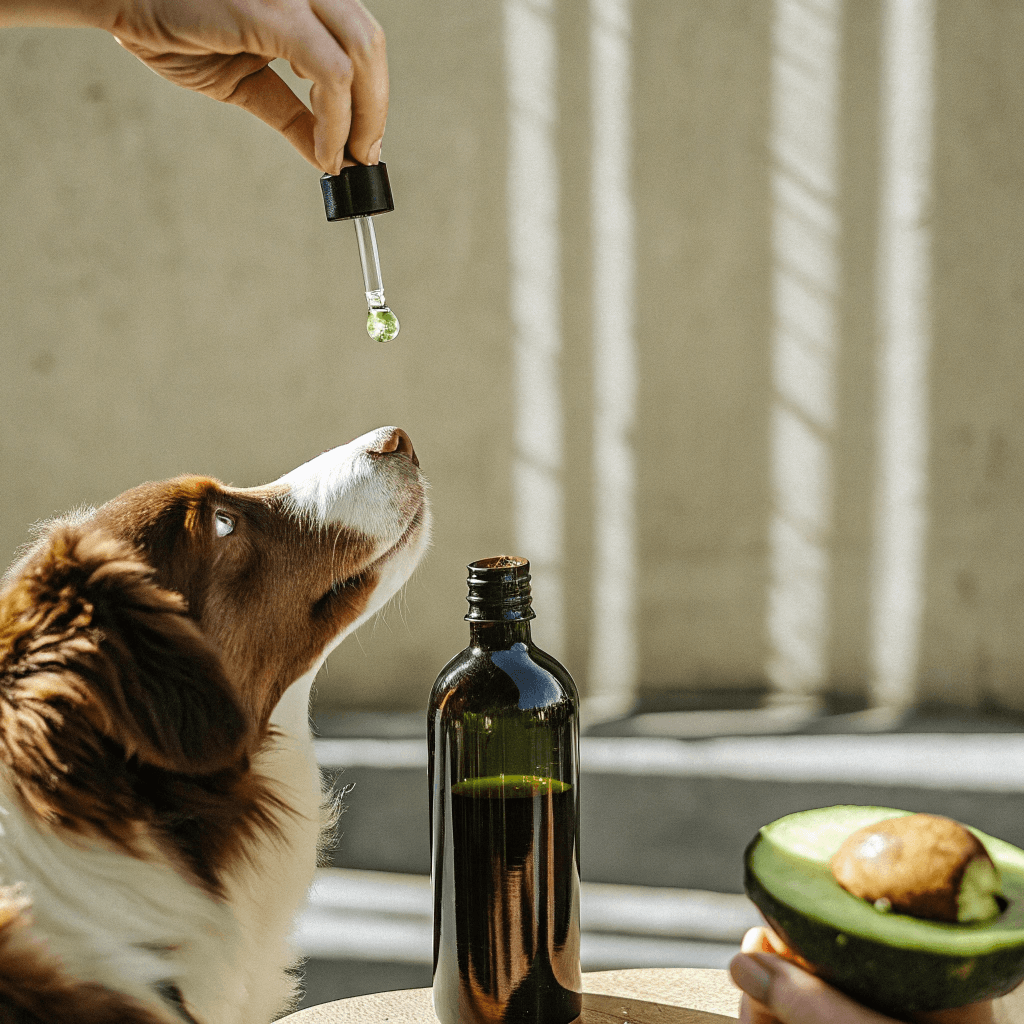How much avocado oil is safe for dogs?
The Growing Popularity of Avocado Oil in Canine Diets
Did you know that over 60% of dog owners now incorporate some form of natural oil into their pet’s diet to support skin, coat, and digestive health?
Among these oils, avocado oil has gained attention — not only for its nutritional benefits but also due to the confusion surrounding its safety for dogs.
Many pet parents wonder:
- Can dogs have avocado oil safely?
- And more specifically: how much avocado oil is safe for dogs?
While our comprehensive guide Can Dogs Have Avocado Oil? The Definitive 2025 Guide for Pet Parents delves into the general safety of avocado oil, this article will answer those specific questions about how much avocado oil is safe for dogs — and more — with insights grounded in veterinary science, expert opinion, and real-world experience. You’ll learn:
✅ The key factors that determine safe dosages ✅ Why refined avocado oil is different from whole avocados ✅ Signs that your dog has had too much ✅ Practical dosage charts tailored by dog size ✅ When to avoid avocado oil altogether
By the end of this guide, you’ll feel confident about how much avocado oil is safe for dogs and how to include it responsibly in your dog’s diet.
🥑 Understanding Avocado Oil: A Quick Overview for Dosage
Ripe avocados’ fleshy pulp is used to obtain avocado oil. It’s rich in monounsaturated fats, especially oleic acid, which supports heart health, reduces inflammation, and improves nutrient absorption.
The crucial point for safety and dosage: Refined avocado oil undergoes processing that effectively eliminates persin, the natural fungicidal toxin found in whole avocados. This makes the refined oil significantly safer than the fruit itself.
For a detailed explanation of why refined avocado oil is safe while whole avocados are problematic, please refer to our main article: Can Dogs Have Avocado Oil? The Definitive 2025 Guide for Pet Parents.
📏 How Much Avocado Oil Can a Dog Eat? Safely
Knowing how much avocado oil can a dog eat depends on several individual factors unique to your pet. There’s no one-size-fits-all answer, emphasizing the importance of veterinary consultation.
| Factor | Impact |
| Size & Weight | Smaller dogs require significantly less; overdosing is easier with miniature breeds. |
| Breed Predisposition | Certain breeds, like Miniature Schnauzers and Cocker Spaniels, are more prone to pancreatitis, making precise dosage critical. |
| Current Diet | If your dog already eats a high-fat commercial food, additional oil may be risky. Consider their overall fat intake. |
| Activity Level | Highly active dogs may tolerate slightly more fat than sedentary ones, but this should not be assumed. |
| Health History | Dogs with past gastrointestinal issues, obesity, or liver disease should strictly avoid extra fat unless under explicit veterinary supervision. |

🐶 General Dosage Guidelines by Size: How much avocado oil is safe for dogs?
Here’s a practical table to help you estimate a safe starting dose. Remember, always begin with the smallest amount and monitor your dog closely.
| Dog Size | Starting Daily Dose | Maximum Recommended Daily Dose |
| Small (<10 lbs) | 1–2 drops | ¼ tsp |
| Medium (10–50 lbs) | ¼ tsp | ½–1 tsp |
| Large (>50 lbs) | ½ tsp | 1–2 tsp |
Export to Sheets
⚠️ Important Note: These are general guidelines for healthy dogs. Always consult your veterinarian before introducing any new supplement or altering dosage.
🛑 How Much Avocado Oil Is Too Much? Recognizing Overdose Signs
Understanding how much avocado oil is too much is crucial to prevent serious health complications. Exceeding recommended dosages can lead to significant risks:
🐢 Gastrointestinal Upset
Even slightly excessive amounts of oil can cause:
- Diarrhea
- Vomiting
- Loss of appetite
- Lethargy
🔥 Pancreatitis (Most Serious Risk)
High-fat foods, including too much avocado oil, can trigger acute pancreatitis, a painful and potentially life-threatening inflammation of the pancreas.
🩺 Real-World Case Study (Journal of Veterinary Internal Medicine): Over 30% of dogs diagnosed with pancreatitis had recently consumed human foods high in fat, including oils and fried snacks, underscoring the risk of over-supplementation.
Symptoms of pancreatitis include:
- Severe abdominal pain (often hunched posture)
- Persistent vomiting
- Fever
- Dehydration
- Extreme lethargy or collapse
If you notice any of these signs after giving your dog avocado oil, stop immediately and contact your veterinarian.
🐘 Weight Gain and Obesity
Oils are exceptionally calorie-dense. Just one teaspoon of avocado oil contains around 40 calories. Over time, even small excesses can rapidly contribute to unhealthy weight gain and obesity-related complications, such as diabetes, joint problems, and heart disease.
How to Add Avocado Oil to Your Dog’s Food in a Safe Way
To ensure your dog receives the benefits without the risks, follow these best practices for introducing avocado oil:
- Choose Refined, High-Quality Oil Look for labels that explicitly state “refined” and confirm it’s free of additives, preservatives, and residual persin.
- Measure Precisely Use proper measuring spoons or droppers. Even small excesses can matter, particularly for smaller dogs.
- Mix with Food Drizzle the measured amount over their regular kibble or mix into wet food. Ensure even distribution to prevent your dog from consuming it all at once.
- Monitor Closely Watch for any digestive upset (vomiting, diarrhea, lethargy) during the first 1–2 weeks. Stop using right away if something appears strange.
- Avoid Cooking with It for Dogs While avocado oil has a high smoke point for human cooking, feeding your dog fried or oily human foods is risky.
Avocado Oil vs Olive Oil: Which Is Better for Dogs? Can I feed olive oil to my dog every day?
When considering natural supplements, pet parents often weigh different options. Can I feed olive oil to my dog every day? To assist you in making an informed decision, let’s compare olive oil and avocado oil. Both have comparable advantages, however there are some significant distinctions:
| Feature | Avocado Oil (Refined) | Olive Oil (Extra Virgin) | Coconut Oil (Virgin) |
| Fat Type | Monounsaturated (Oleic Acid) | Monounsaturated (Oleic Acid) | MCTs (Lauric Acid) |
| Antioxidants | Vitamin E, Lutein | Polyphenols, Vitamin E | Vitamin E, phenols |
| Smoke Point | High (good for light heating) | Moderate (best used raw/low heat) | Moderate |
| Palatability | Mild, neutral flavor | Stronger, sometimes bitter | Distinctive coconut flavor |
| Persin Content | None (if refined) | Not applicable | Not applicable |
| Best For | Skin/coat health, nutrient absorption, mild anti-inflammatory support | Anti-inflammatory support, cardiovascular health, digestive aid | Cognitive function, occasional digestion aid, topical use for skin |

🩺 Veterinary Insight: Both oils are generally safe in moderation for most healthy dogs. The choice often comes down to your dog’s taste preference and your specific health goals. Always consult your vet if your dog has existing medical conditions.
❌ When to Avoid Avocado Oil Entirely
It’s imperative to know when avocado oil is not suitable for your dog. You should unequivocally avoid it if your dog:
- Has a history of pancreatitis or other pancreatic issues, as fats can trigger painful flare-ups.
- Is overweight or obese, as the added calories from oil can exacerbate weight problems and related health issues.
- Has sensitive stomachs or a history of frequent gastrointestinal upset.
- Is currently experiencing vomiting or diarrhea, as additional oil can worsen these symptoms.
- Is on a low-fat prescription diet for any medical condition, as this diet is formulated precisely for their needs.
In these cases, even small amounts of avocado oil can be harmful.
🧾 Final Checklist: Using Avocado Oil Safely
To ensure you’re providing avocado oil in the safest possible way for your canine companion, keep this checklist handy:
✅ Use only refined, high-quality avocado oil. ✅ Start with just 1–2 drops and increase very gradually if approved by your vet. ✅ Measure doses accurately with appropriate tools. ✅ Mix with food — never feed directly or in large gulps. ✅ Monitor for any adverse reactions such as digestive upset or lethargy. ✅ Always consult your vet first before adding any new supplement.
FAQ
1. Question: Is avocado oil safe for dogs?
Answer: Yes, refined avocado oil is generally safe for dogs in small, carefully measured amounts. The refined oil is processed to effectively eliminate “persin,” a natural fungicidal toxin found in whole avocados, making it significantly safer than the fruit itself.
2 Question: What is the main difference between refined avocado oil and whole avocados for dogs?
Answer: The main difference is the presence of “persin.” Whole avocados contain this toxic substance that can be harmful to dogs. Refined avocado oil, however, undergoes a processing method that effectively removes persin, making it safe for consumption in moderate quantities.
3. Question: How can I determine the safe dosage of avocado oil for my dog?
Answer: The safe dosage depends on several individual factors unique to your pet, including their size and weight, breed predisposition, current diet, activity level, and health history. There’s no one-size-fits-all answer. Always start with the smallest amount and monitor your dog closely, consulting with your veterinarian.
4. Question: What are the signs that my dog has had too much avocado oil?
Answer: Signs of excessive avocado oil intake can include gastrointestinal upset such as diarrhea, vomiting, loss of appetite, and lethargy. The most serious risk is pancreatitis, which may manifest as severe abdominal pain, persistent vomiting, fever, dehydration, and extreme lethargy or collapse. It can also contribute to weight gain and obesity.
5. Question: When should avocado oil be avoided for dogs entirely?
Answer: Avocado oil should be unequivocally avoided if your dog has a history of pancreatitis or other pancreatic issues, is overweight or obese, has sensitive stomachs or a history of frequent gastrointestinal upset, is currently experiencing vomiting or diarrhea, or is on a low-fat prescription diet for any medical condition.
6 Question: Can I cook my dog’s food with avocado oil?
Answer: Although avocado oil has a high smoke point (suitable for human cooking), the article advises against cooking your dog’s food with it. Instead, it’s recommended to drizzle the measured amount over their regular kibble or mix it into wet food to ensure even distribution.
7. Question: Is avocado oil better than olive oil or coconut oil for dogs?
Answer: Both avocado oil, olive oil, and coconut oil are generally safe in moderation for most healthy dogs, and each has its own benefits and properties. The choice often comes down to your dog’s taste preference and your specific health goals. Refined avocado oil is excellent for skin/coat health and nutrient absorption, while olive oil is beneficial for anti-inflammatory support and cardiovascular health, and coconut oil may aid cognitive function and digestion. Always consult your vet to determine the most suitable option for your dog.
🧾 Conclusion: Make Informed Decisions and Know How Much Avocado Oil Is Safe for Dogs?
The definitive answer to how much avocado oil is safe for dogs is: very small, carefully measured amounts, precisely tailored to your dog’s size, health status, and existing diet. Refined avocado oil can offer potential benefits like improved coat health, better nutrient absorption, and mild anti-inflammatory effects — but it must be used with utmost caution and responsibility.
Remember the core principles:
- Start incredibly small to assess tolerance.
- Monitor closely for any adverse reactions.
- Always consult your veterinarian for personalized advice.
While many ask, “How much avocado can a dog have a day?” it’s critical to remember that the whole fruit is generally unsafe due to persin and choking hazards, making refined oil the only consideration. When used responsibly, avocado oil can be a safe and beneficial addition to your dog’s diet — but never as a substitute for a balanced, nutritionally complete meal plan.
📥 Free eBook: For the Love of Dogs
Navigating your dog’s diet can feel overwhelming, but it doesn’t have to be. Download your free copy of “For the Love of Dogs”, a comprehensive guide packed with expert insights on canine nutrition, homemade recipes, and safe food practices.
📘 What’s inside:
- Expert-approved superfoods for dogs
- Homemade meal ideas
- Safe oil usage guidelines
- Common toxic foods to avoid

